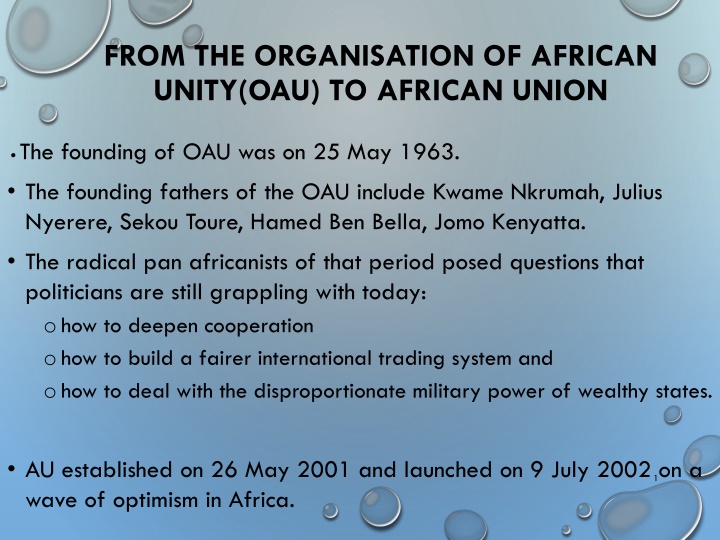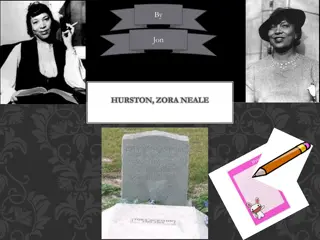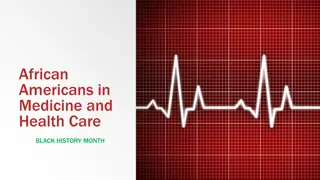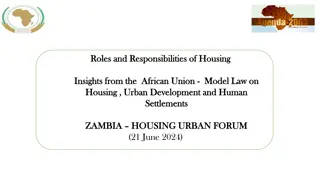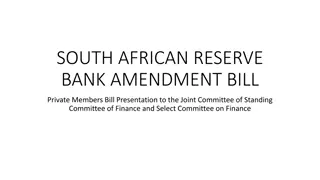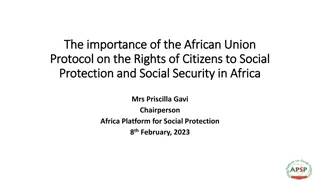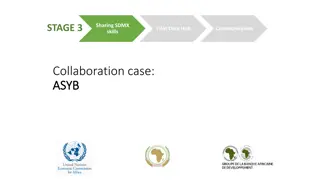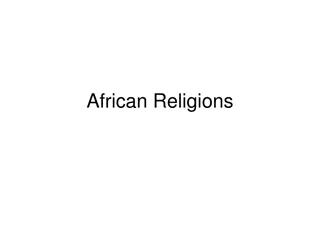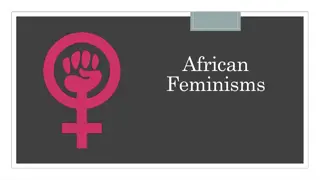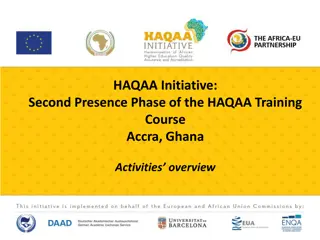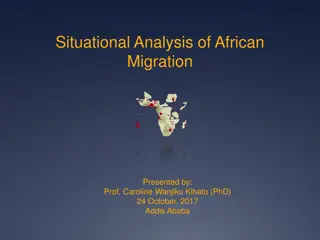Evolution from the Organisation of African Unity (OAU) to the African Union: A Journey Towards Pan-African Unity and Development
The transition from the OAU to the AU marked a significant shift in African politics, focusing on unity, solidarity, and cooperation among member states. The AU aims to promote development, eradicate poverty, defend sovereignty, and incorporate Africa into the global economy. With a strong emphasis on human rights, the AU continues the legacy of the OAU founding fathers, striving to build a fairer international system and address challenges such as disproportionate military power and colonialism. The African Charter on Human and Peoples' Rights, adopted in 1986, reflects Africa's commitment to promoting and protecting human rights on the continent.
Download Presentation

Please find below an Image/Link to download the presentation.
The content on the website is provided AS IS for your information and personal use only. It may not be sold, licensed, or shared on other websites without obtaining consent from the author.If you encounter any issues during the download, it is possible that the publisher has removed the file from their server.
You are allowed to download the files provided on this website for personal or commercial use, subject to the condition that they are used lawfully. All files are the property of their respective owners.
The content on the website is provided AS IS for your information and personal use only. It may not be sold, licensed, or shared on other websites without obtaining consent from the author.
E N D
Presentation Transcript
FROM THE ORGANISATION OF AFRICAN UNITY(OAU) TO AFRICAN UNION The founding of OAU was on 25 May 1963. The founding fathers of the OAU include Kwame Nkrumah, Julius Nyerere, Sekou Toure, Hamed Ben Bella, Jomo Kenyatta. The radical pan africanists of that period posed questions that politicians are still grappling with today: ohow to deepen cooperation ohow to build a fairer international trading system and ohow to deal with the disproportionate military power of wealthy states. AU established on 26 May 2001 and launched on 9 July 2002 on a wave of optimism in Africa. 1
FROM THE ORGANISATION OF AFRICAN UNION(OAU) TO AFRICAN UNION Currently, the African Union comprises 55 Member States. Mauritius joined the AU in August 1968. The current chair of the AU is Egypt with one year term of office ( Feb 2019-2020) whilst the Chairperson of the AU Commission is Tchad, with a four year term of Office( March 2017-2021) and the Deputy Chairperson is from Ghana. The AU is governed by the Constitutive Act which solemnizes the declaration by Africa s leaders to uphold the ideals of the founding fathers of the OAU and AU and the generation of Pan Africanisms on the continent and the diaspora to promote unity, solidarity, cohesion and cooperation among the peoples of Africa and African States. 2
OBJECTIVES OF THE AU To promote the unity and solidarity of African states; To coordinate and intensify their cooperation and efforts to achieve a better life for the continent s 800 million citizens; To defend their sovereignty, territorial integrity and independence; To eradicate all forms of colonialism from Africa; To promote international cooperation, giving due regard to the Charter of the United Nations (1945) and The Universal Declaration of Human rights (1948); To coordinate and harmonise member states political, diplomatic, economic, educational, cultural, health, welfare, scientific, technical and defence policies; To boost development to eradicate poverty and incorporate Africa into the global economy. 3
AFRICAN CHARTER ON HUMAN AND PEOPLES RIGHTS (1986) The regional African human rights system is based on the African Charter on Human and People s rights (also known as the Banjul Charter) was drafted in Banjul from June 1980 to January 1981. The African Charter is not an accident of history. Its creation by the OAU came at a time of increased scrutiny of states for their human rights practices, and the ascendancy of human rights as a legitimate subject of international discourse. It is a human rights instrument that is intended to promote and protect human rights and basic freedoms in the African continent. 4
The Charter was adopted by the former Organisation of the African Union Assembly on 28 June 1981. It entered into force on 21 October 1986 after ratification by the absolute majority of the Member States of the AU. It entered into force on October 21, 1986. Mauritius signed the Charter on 27 February 1992 and ratified same on 19 June 1992. 5
PROTOCOL TO THE AFRICAN CHARTER ON HUMAN AND PEOPLES RIGHTS ON THE RIGHTS OF WOMEN IN AFRICA (MAPUTO PROTOCOL) Although the African Charter is the primary treaty providing a framework for human rights in the region, its provisions on women s rights were largely seen as ineffective and inadequate. For instance, the Charter failed to address foster increased respect for and promotion of women s rights in Africa by States Parties. The drafting of the Protocol to the African Charter on Human and Peoples Rights on the Rights of Women in Africa resulted from years of activism by women s rights supporters in the region which has attempted to reinvigorate the African Charter s commitment to women s equality by adding rights that were not in the Charter and clarifying the obligations of Government s with respect to women s rights. The development of the Protocol was triggered by the outcome of the World Conference on Human Rights which was held by the United Nations in Vienna, Austria in June 1993. 6
PROTOCOL TO THE AFRICAN CHARTER ON HUMAN AND PEOPLES RIGHTS ON THE RIGHTS OF WOMEN IN AFRICA The Protocol to the African Charter on Human and Peoples Rights on the Rights of Women in Africa is also known as the Maputo Protocol alluding to the city where it was adopted. It was adopted on 11 July 2003 in Maputo, Mozambique at the Heads of State Summit of the AU. It entered into force on 25 November 2005 after it was ratified by 15 nations of the AU. As at date, 40 African States have ratified the Protocol (Ethiopia being the most recent in July 2018). 14 Member States are yet to ratify. 3 Member States have neither ratified nor signed (Botswana, Egypt and Morocco). Mauritius signed the Protocol on 29 January 2005 in Addis Ababa. Ratified on 16 June 2017 subject to reservations made with respect to Articles 6(b) and 6(c); Article 9; Articles (2)(k),10(2)(d) and 11(3); Article 12(2) and Article 14(2)(c). 7
PROTOCOL TO THE AFRICAN CHARTER ON HUMAN AND PEOPLES RIGHTS ON THE RIGHTS OF WOMEN IN AFRICA The Protocol guarantees comprehensive rights to women including the right to take part in the political process, to social and political equality with men, to control of their reproductive health, and an end to female genital mutilation. It contains 32 Articles. Reporting is done under Articles 2 24. 8
STATE REPORTING OBLIGATIONS At the 58th session of the African Commission on Human and Peoples' Rights (the African Commission) States were urged to fulfill their reporting requirements for the Maputo Protocol. Article 62 of the African Charter and Article 26 of the Maputo Protocol makes it mandatory for State parties to submit a report every two years to the African Commission outlining the human rights situation in their countries. Article 62 of the African Charter states: Each State Party shall undertake to submit every two years from the date the present Charter comes into force, a report on the legislative or other measures taken with a view to giving effect to the rights and freedoms recognized and guaranteed by the present Charter . Article 26 (1) of the Maputo Protocol provides that: States Parties shall ensure the implementation of this Protocol at National Level, and in their periodic reports submitted in accordance with Article 62 of the African Charter, indicate the legislative and other measures undertaken for the full realization of the rights herein recognized . As at date, 13 Countries have reported on the Maputo Protocol. 9 Nigeria has reported twice. Mauritius is yet to submit its initial report on the Maputo Protocol.
AU SOLEMN DECLARATION ON GENDER EQUALITY IN AFRICA At the Third Ordinary Session of the African Union (AU) Assembly of Heads of State and Government in Addis Ababa, Ethiopia in July 2004, the Heads of State and Government adopted the Solemn Declaration on Gender Equality in Africa (SDGEA). The Declaration is an important African instrument for promoting gender equality and women s empowerment as it strengthens African ownership of the gender equality agenda. The main concerns were related to the status of women and the negative impacts on women of issues such the high incidence of HIV/AIDS among girls and women, conflict, poverty, harmful traditional practices, high population of refugee women and internally displaced women, violence against women, women s exclusion from politics and decision-making, and illiteracy, limited access of girls to education. 10
